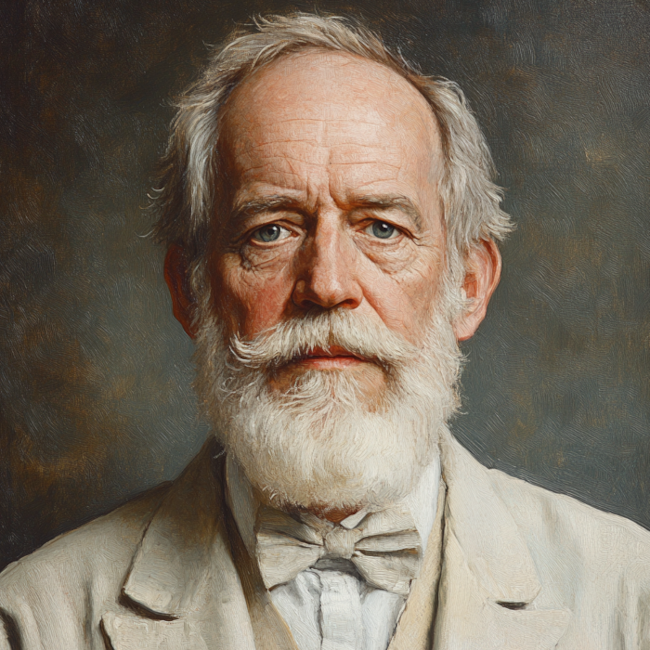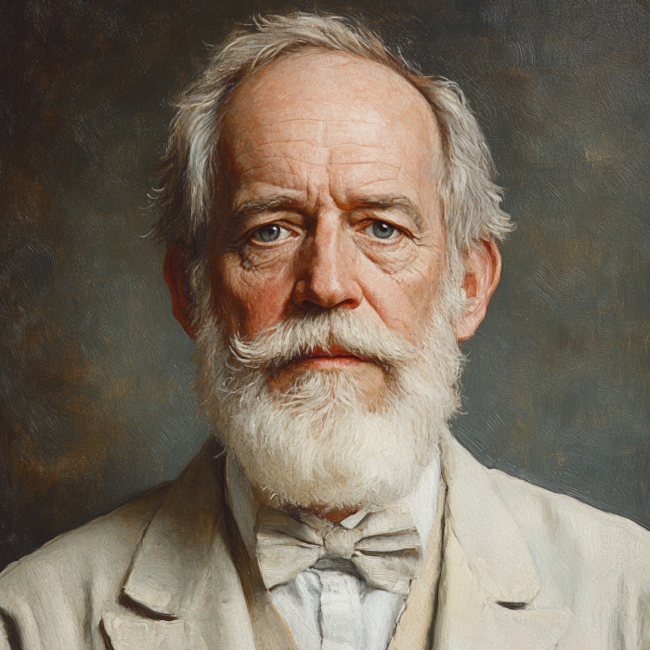


Konstantin Eduardovich Tsiolkovsky (1857–1935) was a Russian and Soviet rocket scientist, aerodynamicist, and pioneer of astronautics. Often referred to as the "father of astronautics" and "father of space travel", Tsiolkovsky made significant contributions to the theory of space exploration, including developing the fundamental rocket equation and conceptualizing space travel long before it became a practical reality. His visionary work laid the theoretical groundwork for modern spaceflight and inspired generations of scientists and engineers. Tsiolkovsky’s theories and publications provided the foundation for rocket science and played a key role in the development of the Soviet space program.
Birth and Childhood: Konstantin Tsiolkovsky was born on September 17, 1857, in the village of Izhevskoye, in the Russian Empire (now part of the Ryazan region in Russia). He was one of 18 children born to his parents, but many of his siblings died in infancy. His father, Eduard Tsiolkovsky, was a Polish-born forester, and his mother, Maria Yumasheva, was Russian. Tsiolkovsky’s childhood was challenging, especially after he contracted scarlet fever at the age of 10, which left him almost completely deaf. This disability made formal education difficult, and he was largely self-taught.
Self-Education and Interest in Science: Due to his hearing impairment, Tsiolkovsky attended school for only a few years before leaving to study on his own. He immersed himself in books and had a voracious curiosity about mathematics, physics, and mechanics. As a young man, he moved to Moscow, where he spent time in the Chertkovskaya Library, studying advanced scientific concepts. During his time in Moscow, Tsiolkovsky was influenced by the works of prominent thinkers, including the British physicist Isaac Newton and the Russian philosopher Nikolai Fyodorov, who envisioned humanity's eventual expansion into the cosmos.
Becoming a Teacher: Tsiolkovsky returned to his family and began working as a teacher of mathematics in the town of Borovsk in 1879. Later, he moved to Kaluga, where he spent most of his life teaching high school students while simultaneously conducting scientific research. Teaching provided him with a modest income, and he spent his spare time exploring the possibilities of human space travel.
Early Experiments and Research: During the 1880s and 1890s, Tsiolkovsky conducted a series of experiments related to aerodynamics and fluid mechanics. He became interested in the concept of building a lighter-than-air craft and in 1885, he published a paper titled "On the Air Resistance of Flying Vehicles", in which he studied the principles of flight. This research was instrumental in his later work on rocketry and space exploration.
First Concepts of Space Exploration: In 1895, Tsiolkovsky published "Dreams of Earth and Sky", in which he presented the idea of space colonization. He envisioned humans living in space, using artificial satellites and space stations as stepping stones for exploration beyond Earth. His imagination and insights into the practicalities of living in space were groundbreaking and would later inspire the development of space stations and human exploration of the cosmos.
Theory of Space Flight and Rockets: Tsiolkovsky is perhaps best known for his work on the theoretical basis of rocketry. In 1903, he published his landmark article, "Exploration of Outer Space by Means of Rocket Devices" (Исследование мировых пространств реактивными приборами), in the Russian scientific journal Nauchnoe Obozrenie. In this work, he laid out the mathematical principles governing rocket propulsion and proposed the use of multistage rockets for space exploration. This paper is now regarded as one of the foundational texts of astronautics.
Tsiolkovsky Rocket Equation: One of Tsiolkovsky's most significant contributions was the Tsiolkovsky rocket equation, which mathematically describes the relationship between a rocket's changing mass, velocity, and the exhaust velocity of its propellant. This equation is fundamental to understanding how rockets achieve the necessary velocity to escape Earth's gravitational pull. The equation is given as:
Where:
This equation established the basic principles of rocket dynamics and remains essential to rocket engineering today.
Concept of Multistage Rockets: Tsiolkovsky was also among the first to propose the concept of multistage rockets, which involves using multiple stages that detach as they expend their fuel. This approach allows rockets to achieve greater speeds and reach space without being weighed down by empty fuel tanks. Multistage rockets are a core element of modern space travel and were used in launching the Apollo missions and many other space missions.
Space Colonization and Artificial Satellites: Tsiolkovsky's imagination went far beyond the basic mechanics of rocketry. He envisioned humans exploring and eventually colonizing space. He believed that humanity's future lay beyond Earth and proposed the construction of artificial satellites, space stations, and space colonies as a way for people to expand into the cosmos. His visionary ideas included creating rotating space stations to generate artificial gravity, a concept that would later inspire real-world space station designs, such as those used on the International Space Station (ISS).
The Philosophy of Space Exploration: Tsiolkovsky was influenced by cosmism, a philosophical movement that emphasized the idea that humanity's destiny was to explore and settle the cosmos. He believed that the expansion of human civilization into space was not only possible but inevitable. Tsiolkovsky viewed space travel as a way to ensure the survival of the human species and as a spiritual endeavor that would lead humanity to a higher level of existence. His ideas were deeply idealistic and resonated with the Russian philosophical movement of cosmism, which saw the exploration of space as a way to fulfill humanity's ultimate potential.
Continued Research and Publications: Throughout his life, Tsiolkovsky remained dedicated to his research and continued publishing works on various topics related to space travel, aerodynamics, and rocket propulsion. His notable publications include "The Future of Earth and Mankind" (1928), in which he discussed the long-term possibilities of space exploration, and "Space Rocket Trains" (1929), where he further elaborated on the concept of multistage rockets.
Lack of Official Support: Despite his groundbreaking ideas, Tsiolkovsky received little formal recognition or financial support during much of his life. He worked in relative obscurity, and it was only later, with the rise of the Soviet space program, that his contributions were acknowledged. In the early years of the Soviet Union, Tsiolkovsky's work began to receive more attention, and he was eventually honored by the Soviet government as a pioneer of astronautics.
Influence on Soviet Rocket Scientists: Tsiolkovsky's ideas laid the theoretical foundation for the development of the Soviet space program. His work influenced key Soviet rocket scientists, such as Sergey Korolev, who became the chief engineer of the Soviet space program and was instrumental in launching the first artificial satellite, Sputnik 1, in 1957. Tsiolkovsky's influence extended beyond Russia, inspiring rocket pioneers like Robert Goddard in the United States and Hermann Oberth in Germany.
Death (1935): Konstantin Tsiolkovsky died on September 19, 1935, in Kaluga, at the age of 78. By the time of his death, his ideas were beginning to gain recognition, and his reputation as the father of modern astronautics was growing. Today, Kaluga is home to the Tsiolkovsky State Museum of the History of Cosmonautics, dedicated to preserving his legacy and celebrating the history of space exploration.
Pioneer of Space Travel: Konstantin Tsiolkovsky is often considered the father of astronautics because of his pioneering theoretical contributions to rocket science and space exploration. His vision of space travel and humanity's expansion into the cosmos inspired future generations of scientists, engineers, and astronauts. Many of his ideas, such as multistage rockets, space stations, and artificial gravity, became fundamental concepts in the development of space technology.
Theoretical Foundations of Spaceflight: Tsiolkovsky's rocket equation provided the essential theoretical foundation for understanding how rockets could overcome Earth's gravity and reach space. His work made it possible for future engineers and scientists to calculate the requirements for launching and propelling rockets beyond Earth's atmosphere. Without his contributions, the development of rockets capable of reaching space might have been significantly delayed.
Inspiration for the Space Age: Tsiolkovsky's visionary ideas inspired the Soviet space program, which achieved a series of milestones in the Space Race, including launching the first artificial satellite, Sputnik 1, and sending the first human, Yuri Gagarin, into space in 1961. The success of the Soviet space program was built upon the foundation laid by Tsiolkovsky's theoretical work. His influence extended beyond the Soviet Union, as his ideas helped to inspire the global space age and the pursuit of human exploration beyond Earth.
Honors and Memorials: Tsiolkovsky’s contributions have been commemorated in many ways. The Tsiolkovsky State Museum of the History of Cosmonautics in Kaluga is dedicated to his life and work. A crater on the Moon was named in his honor, as well as asteroid 1590 Tsiolkovskaja. He is also remembered in Russia as a national hero and a visionary whose ideas helped pave the way for the space age.
Konstantin Tsiolkovsky was a visionary scientist, thinker, and the pioneer of modern rocketry and astronautics. Despite his early hardships, including his near-complete deafness, he dedicated his life to the study of space travel and aerodynamics, formulating theories that would lay the groundwork for human space exploration. His rocket equation, the concept of multistage rockets, and his vision of space colonization are some of the foundational contributions that have shaped the field of astronautics.
Tsiolkovsky's unwavering belief in humanity's potential to reach the stars has inspired countless scientists and explorers to pursue the dream of space travel. His legacy lives on in the achievements of the Soviet and Russian space programs, as well as in the broader pursuit of human exploration beyond our planet. Tsiolkovsky's life and work stand as a testament to the power of imagination, scientific inquiry, and the belief that the future of humanity lies among the stars.

We use cookies
We use cookies and other tracking technologies to improve your browsing experience on our website, to show you personalized content and targeted ads, to analyze our website traffic, and to understand where our visitors are coming from. Privacy Policy.